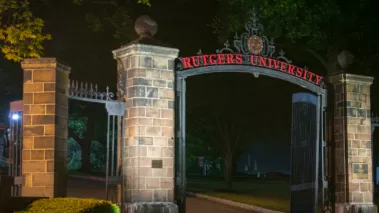Table of Contents
Rutgers president orders review of ruling against professor for Facebook posts about white gentrification in Harlem

In a letter sent Wednesday evening, Rutgers President Robert L. Barchi informed senior administrators that he has ordered the reevaluation of an earlier ruling finding Professor James Livingston guilty of violating university policy for two Facebook posts critical of white gentrification in Harlem.
The tenured professor of history at Rutgers-New Brunswick came under investigation earlier this summer by the university’s Office of Employment Equity after several of Livingston’s Facebook posts grabbed the attention of the media.
On May 31, while at a restaurant in his Harlem neighborhood, Livingston posted on his personal account, “OK, officially, I now hate white people. I am a white people, for God’s sake, but can we keep them–us–us out of my neighborhood?” He wrote that the restaurant was “overrun with little Caucasian assholes” and said, “I hereby resign from my race.”
After Facebook removed the post the following day, citing its Community Standards on hate speech, Livingston posted, “I just don’t want little Caucasians overrunning my life … remand them to the suburbs, where they and their parents can colonize every restaurant.”
By June 1, the posts had drawn the attention of conservative website The Daily Caller, and coverage soon followed in local and national outlets.
Media coverage inevitably led offended members of the public to complain to Rutgers. The Office of Employment Equity (OEE) launched an investigation and, in a July 31 findings report, determined that Livingston’s posts violated the university’s Policy Prohibiting Discrimination and Harassment (despite the report’s failure to identify any Rutgers student or community member complaints accusing Livingston of discriminatory conduct). The report concluded the posts were not protected by the First Amendment and amounted to racial discrimination in violation of university policy.
After Livingston’s appeal was denied, FIRE wrote to President Barchi on Aug. 20 to demand that the ruling be reversed. We argued that Professor Livingston’s Facebook posts to his personal account amounted to speech on a matter of public concern — namely, gentrification and race — and are certainly protected by the First Amendment. We reminded the president of his laudable promise in public comments that: “Faculty members, as private citizens, enjoy the same freedoms of speech and expression as any private citizen and shall be free from institutional discipline in the exercise of these rights.”
FIRE’s call to reverse the finding was joined by others, including the American Association of University Professors, which wrote that any discipline of Livingston based on OEE findings would violate Rutgers’ academic freedom policy.
This week, President Barchi appeared to take the first step towards reversing the OEE ruling.
In a letter sent to senior administrators, Barchi explains that he has sent back the findings report to the OEE with the directive to “more rigorously analyze the facts and assumptions underlying its conclusions.” He writes that, while he found Livingston’s speech offensive, “few values are as important to the University as the protection of our First Amendment rights—even when the speech we are protecting is insensitive and reckless.”
The president will also convene an advisory group of scholars and Rutgers faculty to provide guidance on alleged policy violations that raise First Amendment and academic freedom questions.
President Barchi’s words are encouraging and lead us to expect that the OEE’s reevaluation will correct its earlier flawed First Amendment analysis. As we argued to the president on Aug. 20, if Livingston’s speech in this case is not protected by the First Amendment, all of Rutgers faculty should be afraid to post or say anything potentially offensive or controversial, particularly when they are one screenshot or recording away from riling an internet backlash.
We hope to soon be able to report that Professor Livingston has been cleared of charges and that Rutgers stands firmly behind its faculty’s rights to free expression and academic freedom.
Recent Articles
Get the latest free speech news and analysis from FIRE.

VICTORY: Court vindicates professor investigated for parodying university’s ‘land acknowledgment’ on syllabus

Can the government ban controversial public holiday displays?

DOJ plan to target ‘domestic terrorists’ risks chilling speech
